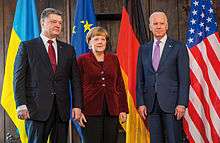Germany–Ukraine relations
Germany–Ukraine relations are foreign relations between Germany and Ukraine. Diplomatic relations between Ukraine and Germany originally were established in 1918 as between Ukrainian People's Republic and German Empire, but were discontinued soon thereafter due to occupation of Ukraine by the Red Army. Current relations were resumed in 1989 at a consulate level, and in 1992 as full-scale diplomatic mission.
 | |
Germany |
Ukraine |
|---|---|
| Diplomatic mission | |
| Embassy of Germany, Kiev | Embassy of Ukraine, Berlin |
| Envoy | |
| Ambassador Ernst Reichel | Ambassador Andriy Melnyk |
History

German Chancellor Angela Merkel with Ukrainian President Petro Poroshenko, 7 February 2015
- 1918 - In the aftermath of the Brest-Litovsk Treaty, German troops provided military assistance to Ukraine against the Soviet Russia; German military administration was instrumental in Pavlo Skoropadskyi coup against the Ukrainian People's Republic (April 1918) and the establishment of the short-lived Ukrainian State; the first German Ambassador to Ukraine was Alfons Mumm von Schwarzenstein; the first Ukrainian Ambassador to Germany was Oleksandr Sevriuk (as Chargé d'affaires) who was replaced with Teodor Shteingel.
- 1941-1944 - German troops (with the help of Italians, Romanians, and Hungarians) occupy most of Soviet Ukraine and portioning between General Government and Reichskommissariat Ukraine; OUN's Ukrainian Insurgent Army alternates between fighting the Germans and accepting their help against the Soviets.
- 1944-1950s - surviving OUN leaders find refuge in the US occupation zone of Germany, which becomes home to many Ukrainian displaced persons
- 1953 - Radio Free Europe/Radio Liberty (then called "Radio Liberation") starts its operations in Munich, broadcasting to Ukraine in Ukrainian
- 1959 - Stepan Bandera killed in Munich by a Soviet agent
- 2011 - the Nord Stream makes Ukraine economically vulnerable
- 2014 - EU sanctions against Russia. Germany belongs to the Normandy format.
- 2018 - the planned Nord Stream 2 gas pipeline from Russia to Germany was opposed by Ukrainian President Petro Poroshenko.[1]
Diplomatic missions location
Germany has an embassy in Kiev and 1 Consulate-General in Donetsk (due to Russian aggression (War in Donbass) temporarily in Dnipro).[2][3]
Ukraine has an embassy in Berlin and 3 Consulates-General in Frankfurt, Hamburg and Munich.
Head of missions (1917-1920s)
- Germany
- 1917-18 Alfons Mumm von Schwarzenstein
- 1918-19 Johannes (Hans) Graf von Berchem
- Ukraine
- 1918-18 Oleksandr Sevriuk (chargé d'affaires)
- 1918-18 Omelian Koziy (chargé d'affaires)
- 1918-18 Teodor Shteingel
- 1918-20 Mykola Porsh
- 1921-23 Roman Smal-Stocki
- 1923-23 Nikolaus von Wassilko (chargé d'affaires)
- Soviets (representative of the Soviet government in Ukraine)
- 1921-23 Voldemar Aussem
Resident diplomatic missions
- Germany has an embassy in Kiev.
- Ukraine has an embassy in Berlin and consulates-general in Frankfurt, Düsseldorf, Hamburg and Munich.
 Embassy of Germany in Kiev
Embassy of Germany in Kiev Embassy of Ukraine in Berlin
Embassy of Ukraine in Berlin
See also
References
- "Germany and Russia gas links: Trump is not only one to ask questions". The Guardian. 11 July 2018.
- Consulate-General in Donetsk. Embassy of Germany in Ukraine.
- Consulate-General in Donetsk official website
External links
- German Foreign Ministry about relations with Ukraine
- German embassy in Kiev (in German and Ukrainian only)
- Ukrainian embassy in Berlin (in German and Ukrainian only)
This article is issued from Wikipedia. The text is licensed under Creative Commons - Attribution - Sharealike. Additional terms may apply for the media files.

